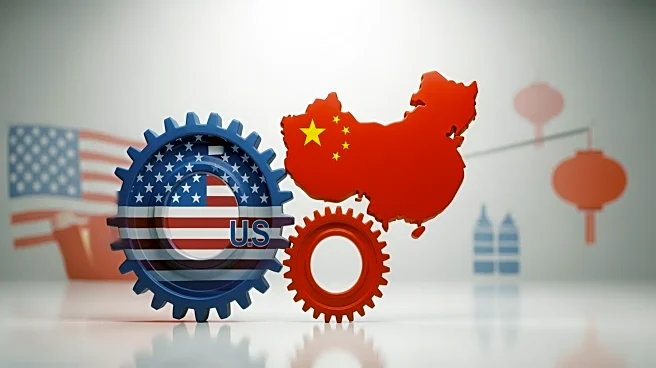What's Happening?
Top economic officials from the United States and China have commenced discussions in Kuala Lumpur to prevent an escalation of their ongoing trade war. The talks aim to ensure a meeting between U.S. President Donald Trump and Chinese President Xi Jinping
next week. This comes after President Trump threatened to impose new 100% tariffs on Chinese goods starting November 1, in response to China's expanded export controls on rare earth magnets and minerals. The discussions are part of efforts to maintain a delicate trade truce, previously crafted by U.S. Treasury Secretary Scott Bessent, U.S. Trade Representative Jamieson Greer, and Chinese Vice Premier He Lifeng. The meeting is taking place on the sidelines of the Association of Southeast Asian Nations summit, with few details provided by the Malaysian government or the U.S. and Chinese sides.
Why It's Important?
The outcome of these talks could significantly impact global trade dynamics, particularly affecting industries reliant on rare earth minerals and technology exports. The U.S. agricultural sector, especially soybean farmers, could benefit from a resolution, as they have been adversely affected by China's freeze on U.S. soybean purchases. Additionally, the talks could influence geopolitical relations, with Taiwan's status and the release of Hong Kong media tycoon Jimmy Lai being potential discussion points. A successful meeting between Trump and Xi could lead to interim relief on tariffs and technology controls, stabilizing economic relations between the two superpowers.
What's Next?
The talks are expected to pave the way for a high-stakes meeting between President Trump and President Xi at the Asia-Pacific Economic Cooperation summit in South Korea. The discussions may revolve around interim relief on tariffs, technology controls, and Chinese purchases of U.S. soybeans. The meeting could also address broader geopolitical issues, including Taiwan and Hong Kong. The outcome of these talks will be closely watched by global markets and political analysts, as it could set the tone for future U.S.-China relations.














